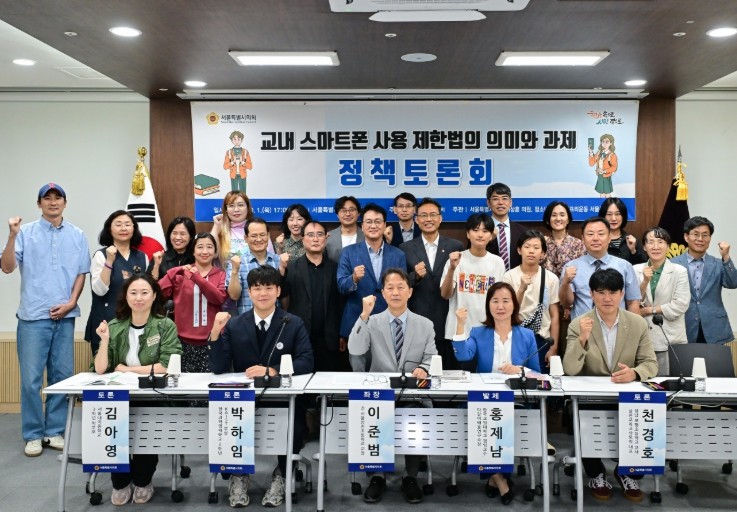The policy debate on the “Law for Restricting Smartphone Use in Schools” was hosted by the chairman of the Seoul City Council Policy Committee, Lee Sang-hoon (Democratic Party, Gangbuk 2), in the second conference room of the Seoul City Council on October 1st.
This debate was organized to discuss the policy implications and preparatory tasks in the educational field, ahead of the implementation of the “Elementary and Secondary Education Act” amendment in March next year, which restricts students’ use of smart devices during classes. About 60 people, including teachers, students, parents, and experts, attended to share voices from the field.

Lee Sang-hoon, who acted as the moderator, explained, “Research results suggest that smartphones and social media disperse the attention of adolescents and cause the ‘popcorn brain’ phenomenon, where they become accustomed to strong stimuli,” adding, “Today’s debate serves as a platform to reflect on whether our society has neglected children in a digital environment and to explore practical solutions.”
The first presenter, Hong Jae-nam, director of the Everyone Learning Research Institute, emphasized, “The problem of adolescents’ over-dependence on smartphones is already at a serious level,” and noted, “Although clashes between teachers and students are expected with the implementation of the law, it should not be viewed as an issue of enforcement but rather as a support to encourage adolescents to seek proper usage methods on their own.”
Representing the students, Park Ha-im, a student at the Korea Science Academy of KAIST, stated, “The restriction on smartphone use is expected to have a positive impact on improving study concentration and peer relationships,” and proposed, “Instead of simple regulation, it is necessary to educate students to recognize the risks of media use and control it autonomously.”
Kim Ah-young, a parent from Seoul Naegok Middle School, remarked, “We need to ponder fundamental questions, such as why children want to use smartphones and how they perceive the school environment,” and stressed, “Conversations starting from the children’s perspective should be the starting point of policy.”
Kim Hyun-soo, a professor of psychiatry at Myongji Hospital, pointed out, “Adolescent mental health issues such as sleep deprivation, decreased social skills, and concentration problems due to smartphone and SNS addiction are rapidly increasing,” and criticized, “This is not a personal issue but a responsibility of the tech companies designing the addictive algorithms.”
Concluding the debate, Chairman Lee Sang-hoon declared, “The advancement of technology is dominating not only the convenience of humans but also the thinking and relationships of adolescents,” and pledged, “The opinions raised today will be reflected in Seoul’s educational policies to establish practical solutions.”